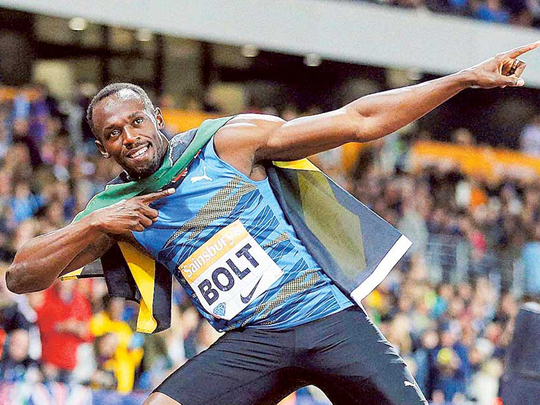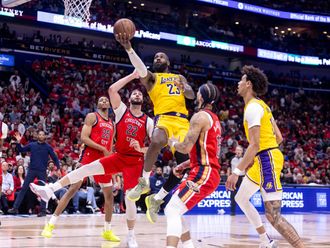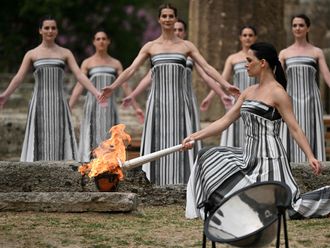
London: Usain Bolt insists he is still king of the sprinters after returning from injury with back-to-back 100-metre times of 9.87 sec at the London Diamond League meeting.
Asked if his winning performances — in the heats and final on a rain-soaked Olympic Stadium track — proved that he was still the world’s number one, the 28-year-old Jamaican replied defiantly: “I was never number two.”
“I am still number one,” said Olympic champion and world record holder Bolt. “I will continue being number one. Until I retire, that’s the plan.”
On 100-metre times recorded in 2015, Bolt is now ranked number six.
Justin Gatlin, the American who has served two doping bans, tops the list with 9.74 sec and has also run 9.75 sec twice and 9.78 sec.
Bolt, however, clearly has room for improvement before he defends his 100 and 200-metre titles at the world championships in Beijing, which begin on August 22, on the Bird’s Nest track where he won his first trio of Olympic gold medals (100, 200 and 4x100 relay) in 2008.
The Jamaican has won every global 100 and 200-metre title contested over the past seven years, with the exception of the 100 metres at the 2011 world championships in South Korea, when he was disqualified for a false start.
It is a period of sprint domination unmatched in the history of track and field and, despite missing six weeks of competitive action following the New York Diamond League meeting because of a pelvic problem, Bolt cannot be discounted from striking gold again.
The fact that he did not get off to the best of starts in his heat and got off to a sluggish one in the final shows that he has room for improvement in the four weeks ahead — as does the fact that he was running on a wet track and into a head wind on both occasions (-0.8 metres per second in the final and -1.2 metres per second in the heat).
Asked how fast he thought he could go in Beijing, Bolt replied: “Anything is possible. I thought I would run fast in the final tonight but I got a bad start.
“When I got a bad start, then I kind of lost focus for a minute and lost my form, but at the last I got it back. It taught me a lot, these two races.
“I just need to remember, if I have a bad start, then I need to focus on the work I have done and get the job done.
“I was not looking for any specific time but I know I could have gone faster if I had got my start.”
There have been claims that Bolt has been stopping the clock at 9.7 sec on the training track, an assertion he declined to dismiss.
“I have been running fast,” he said. “I can’t say I haven’t been running fast in training.
“It is easier to run fast in training because you are under no pressure and you just have to work on it.”
Having drastically improved on his one previous 100 metres time of the year — 10.12 sec in Rio de Janeiro in April — Bolt added that his two London performances had set him up nicely for the world championships.
“It does help the confidence,” he said. “I have been putting in the work and I can see it is coming out on the track. It definitely looks good.”
For Bolt’s close friend, Mo Farah, returning to the track where he won gold at 5,000 and 10,000 metres for the host nation at the 2012 Olympics proved to be a tonic after the furore caused by doping allegations levelled against his coach Alberto Salazar last month.
The 32-year-old Briton won the 3,000 metres in 7 min 34.66 sec, the fastest time in the world this year and a personal best, and said that Bolt’s winning return had inspired him.
“He is a legend of the sport,” said Farah. “We take it for granted what he does. To achieve what he has and to keep winning is incredible.
“When he retires, it is then that we will realise how good he is.”












